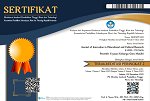History, Cultural Shifts, and Adaptation in Social Change: An Ethnographic Study in the Aboge Islamic Community
(1) Universitas PGRI Yogyakarta, Indonesia
(2) Universitas Jember, Indonesia
(3) Sekolah Tinggi Hukum Militer AHM-PTHM, Indonesia
(4) Institut Agama Islam Muhammadiyah Kotamobagu, Indonesia
Abstract
Keywords
Full Text:
PDFReferences
Adams, R., Fujii, A., & Mackey, A. (2005). Research Methodology: Qualitative Research. In C. Sanz (Ed.), Mind and Context in Adult Second Language Acquisition: Methods, Theory, and Practice (pp. 69–102). Georgetown University Press.
Agustina, I. H., Fardani, I., Aji, R. R., & Ghiffary, M. (2022). The Study of the Ancient Philosophy of “Aboge†in the Embodiment of a Space (Case: Cirebon City, Indonesia). Civil Engineering and Architecture, 10(6), 2330–2337. https://doi.org/10.13189/cea.2022.100608
Amin, M. L. (2017). Eko-Sufisme Islam Aboge Masjid Saka Tunggal Cikakak Banyumas. Jurnal Penelitian, 14(2). https://doi.org/10.28918/jupe.v14i2.969
Ardiansyah, F., Kurniati, R., & Amirudin, A. (2021). Community-based Ecotourism Management in Cikakak Village, Wangon District, Banyumas Regency. E3S Web of Conferences, 317.
Creswell, J. W., Hanson, W. E., Clark Plano, V. L., & Morales, A. (2007). Qualitative Research Designs: Selection and Implementation. The Counseling Psychologist, 35(2), 236–264.
Creswell, J. W., & Creswell, J. D. (2017). Research design: Qualitative, quantitative, and mixed methods approaches. Sage publications.
Darmalaksana, W. (2013). Kerukunan Umat Beragama di Indonesia (Belajar Keharomonisan dan Toleransi Umat Beragama Di Desa Cikakak, Kec. Wangon, Kab. Banyumas). Jurnal Dinamika Hukum, 13(3).
Denzin, N. K., & Lincoln, Y. S. (Eds). (2018). The SAGE Handbook of Qualitative Research. Sage Publications.
Diniyanto, A. (2021). Legal Protection Policy for Minority Groups (Evidence from Aboge Group In Purbalingga Indonesia). Journal of Indonesian Legal Studies, 6(2), 353–388.
Durkheim, E. (1965). The Elementary Forms of Religious Life. The Free Press.
Falinda, F. (2012). Sistem Keyakinan dan Ajaran Islam Aboge. IBDA`: Jurnal Kajian Islam Dan Budaya, 10(2).
Hernández, G. (2013). The Salamanca. Ethnographic accounts, oral history and collective memory | Las salamancas testimonios etnográficos, historia oral y memoria colectiva. Anclajes, 17(2), 17–31.
Ho, M.-C., & Chen, Y.-H. (2020). Designing assistive devices for sacred palanquin carriers: A glocalization community design. Sustainability (Switzerland), 12(8), 3253. https://doi.org/10.3390/SU12083253
Hudi. (2016). Implementasi Penanggalan Jawa Islam Sistem Aboge dalam Upacara Ritual di Desa Sukodono Tahunan Jepara. Isti’dal, 3(2614–68878).
Izzuddin, A. (1970). Hisab Rukyat Islam Kejawen (Studi atas Metode Hisab Rukyah Sistem Aboge). Al-Manahij: Jurnal Kajian Hukum Islam, 9(1). https://doi.org/10.24090/mnh.v9i1.516
Koentjaraningrat. (1989). Kebudayaan, Mentalitas, dan Pembangunan. Gramedia Pustaka Utama.
Krezhevskikh, O. V., & Karataeva, N. A. (2022). Experience in the application of ethnopedagogics in the subjects of the Russian Federation, 55(1), 77–94. https://doi.org/10.32744/pse.2022.1.5
Miles, M. B., Huberman, A. M., & Saldaña, J. (2014). Qualitative data analysis: a methods sourcebook (Third Edit). SAGE Publications.
Nashihin, H., & Dewi, P. A. (2020). Tradisi Islam Nusantara Perspektif Pendidikan Multikultural. Jurnal Islam Nusantara, 3(2).
Nisa, F., & Nur, I. (2021). Historisitas Penanggalan Jawa Islam. ELFALAKY, 5(1).
Prabowo, A., Mamat, M., Sukono, & Ngadiman. (2019). Carrying Javanese Local Wisdom in Mathematical Model. Journal of Physics: Conference Series, 1179(1). https://doi.org/10.1088/1742-6596/1179/1/012005
Prawiro, A. M. B. (2014). Islam Aboge: Islam and Cultural Java Dialogue (A Study of Islam Aboge Communities in Ujungmanik, Cilacap, Central Java, Indonesia). International Journal of Nusantara Islam, 1(2). https://doi.org/10.15575/ijni.v1i2.29
Rachmadhani, A. (2016). Role of Wali, Ancient Mosque and Sacred Tomb in Islam Spreading Dynamics in Cikakak. IBDA`: Jurnal Kajian Islam Dan Budaya, 14(2). https://doi.org/10.24090/ibda.v14i2.685
Sakirman. (2016). Islam Aboge Dalam Tradisi Jawa Alastua. IBDA` : Jurnal Kajian Islam Dan Budaya, 14(2).
Sodli, A. (2017). Dinamika Hubungan Antara Penganut Islam Aboge Dengan Umat Islam Lainnya di Kabupaten Banyumas. International Journal Ihya’ ’Ulum Al-Din, 18(2).
Staub, P. O., Geck, M. S., & Weckerle, C. S. (2011). Incense and ritual plant use in Southwest China: A case study among the Bai in Shaxi. Journal of Ethnobiology and Ethnomedicine, 7.
Sulaiman. (2013). Islam Aboge Pelestarian Nilai-Nilai Lama Di Tengah Perubahan Sosial. Analisa, 20(1).
Suprapto, Y., Nur, D. M. M., Retno, D., & Luqman, M. (2020). Internalisasi Nilai-Nilai Islam Komunitas Aboge Kepada Anak Usia Sekolah Dasar di Desa Cikakak Kecamatan Wangon Kabupaten Banyumas. IJTIMAIYA: Journal of Social Science Teaching, 4(1). https://doi.org/10.21043/ji.v4i1.7218
Syahrin, M. A., Turmudi, T., & Puspita, E. (2016). Study ethnomathematics of aboge (alif, rebo, wage) calendar as determinant of the great days of Islam and traditional ceremony in Cirebon Kasepuhan Palace. AIP Conference Proceedings, 1708. https://doi.org/10.1063/1.4941172
Toleubekova, R., & Zhumataeva, E. (2018). The role of ethnopedagogy in shaping positive attitudes towards traditional values of Kazakh people among master’s students majoring in education in Kazakhstan. Problems of Education in the 21st Century, 76(6), 834–846.
Tsendsuren, C., Yadav, P. L., Kim, S., & Han, S.-H. (2021). The effects of managerial competency and local religiosity on corporate environmental responsibility. Sustainability (Switzerland), 13(11).
Windarani, N. A., Perguna, L. A., & Bustami, A. L. (2021). Membaca Rasionalitas Masyarakat Islam Aboge dalam Penggunaan Sikep Penglaris di Dusun Tumpangrejo Kabupaten Malang. Satwika: Kajian Ilmu Budaya Dan Perubahan Sosial, 5(1). https://doi.org/10.22219/satwika.v5i1.15654
Yaqin, H. (2019). Konstruksi Kearifan Lokal Islam Aboge di Probolinggo. HUMANISTIKA: Jurnal Keislaman, 4(1). https://doi.org/10.36835/humanistika.v4i1.28.
Refbacks
- There are currently no refbacks.
View My Stats

